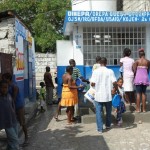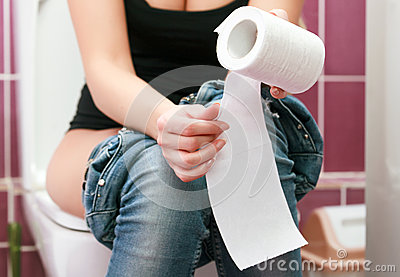 I’ve done some toilet hugging in my days, but we’ll skip those sordid details for now. It’s been one of those insanely busy travel weeks, but wanted to mention an event, the International Water Forum, I had the pleasure of participating in Tuesday on Capitol Hill. I was asked to present the work of United Water and Suez Environnement for provide life-saving water to the people of Haiti, who have suffered greatly since the devastating earthquake of 2010.
I’ve done some toilet hugging in my days, but we’ll skip those sordid details for now. It’s been one of those insanely busy travel weeks, but wanted to mention an event, the International Water Forum, I had the pleasure of participating in Tuesday on Capitol Hill. I was asked to present the work of United Water and Suez Environnement for provide life-saving water to the people of Haiti, who have suffered greatly since the devastating earthquake of 2010.
While we often talk of the “water crisis” here in the U.S., our problems pale in comparison to the dire conditions of so many around the world, including Haitians. I was excited to talk about the work my company is doing in Port-au-Prince and Milot. Pictured here is a water kiosk, which provides clean, safe water for 1,300 families (or 7,800 people). United Water is looking to raise an additional $6M to construct several hundred more of these kiosks to provide water to 1.3 million Haitians without access to water. The earthquake destroyed what little water infrastructure existed, making difficult living conditions even more difficult. In fact, many Haitians were forced to get their water from open sewers and contaminated streams, resulting in 8,000 dying of cholera in the Fall of 2010, and another 800,000 being stricken by this deadly disease. My colleagues at United Water are also providing technical assistance and financial support to provide clean, safe water to Hospital Sacre Coeur in Milot – a 120 bed hospital 4 hours north of Port-au-Prince – founded by the Crudem Foundation here in the U.S.
But back to hugging toilets. Tuesday also happened to be World Toilet Day. And I’m thankful I’ve got several in my household to hug. Not a sexy or glamorous topic and, in fact, one that very few people think about – or want to think about. But think about this. Over 2.5 Billion people around the globe do not have access to basic sanitation and 1.5 have no toilets. It was great to meet Lisa Schechtman with Water Aid America. What an amazing and inspiring woman, who’s life-calling is to bring about greater awareness and galvanize support for helping our fellow human beings most in need, the poorest of the poor. Lack of water and sanitation hurt girls and women the most. Women in developing countries are responsible for walking many miles each day in search of water for their household. And without basic sanitation, due to hygiene and cultural barriers, girls are unable to go to school and get an education. According to Lisa,
Life without these services is a life of poor health, nutrition, education and employment. It is a life of walking long distances to collect water, which takes an estimated 26% of women’s time in rural Africa, 40 billion hours total each year; a life of missing school, work, and playtime because, in many cultures, bringing water home is the only priority for women and girls.
It is a life without a dignified toilet, a life that leads women and girls to spend 97 billion hours each year finding a place to go. It is a life in which fear of attack, and physical and sexual violence comingle with walking for water and seeking a private place to urinate or defecate. According to research conducted in Bhopal, India, 94% of women interviewed said they had faced violence or harassment when going out to defecate and more than one-third had been physically assaulted.
This is the life of women and girls in large part because they are more likely than men and boys to be poor and voiceless. Yet, women also have different needs when it comes to basic services. The reasons for this are both biological and cultural.
Women’s ability to reproduce makes the need for safe water, sanitation and hygiene especially important. When a woman is pregnant, access to safe water, sanitation and hygiene can be a matter of life and death. After all, the moments and days surrounding the birth of a child are fragile for both mom and baby; a lack of water for washing is a risk no one should face. 15% of all maternal deaths are caused by infections in the six weeks after childbirth, mainly due to unhygienic conditions and poor infection control during labor and delivery.
Likewise, neonatal causes account for 44% of all deaths of children under five; these include infections like sepsis, preventable with good hygiene. Imagine the lives that could be saved.
Even if a woman never gets pregnant, they will menstruate. In many places, menstruation is grounds for stigma, discrimination, prohibitions from using shared resources like water taps, and missed school days.
Safe drinking water, sanitation and hygiene services and education (WASH) can help women and girls remain active in their daily lives. For example, constructing secure, sex-segregated latrines at schools can give girls a place to manage their menstrual hygiene needs, keeping them clean, providing them dignity, and creating a measure of protection against discriminatory cultural norms, such as purity norms that posit that menstruating women will contaminate food or water pumps. Then, perhaps, they can just be students.
Community-based education about the importance of equal access to WASH can also help reduce discrimination and lack of access to basic services. For example, I recently had the opportunity to join local WaterAid staff in a village in Papua New Guinea, to speak families about WASH. It took some very gentle prodding, but the women in one extended family finally opened up about menstruation, acknowledging that they had never before spoken about it in front of their husbands—while their husbands looked on silently, even curiously, but did not intervene.
We are a privileged and fortunate people in the U.S. And I’m thankful everyday for the riches and modern conveniences of this great Nation. So next time you use or hug your toilet, think of those kids and families that don’t have one. And consider – just consider – supporting organizations like Water Aid America who are doing such important work.

